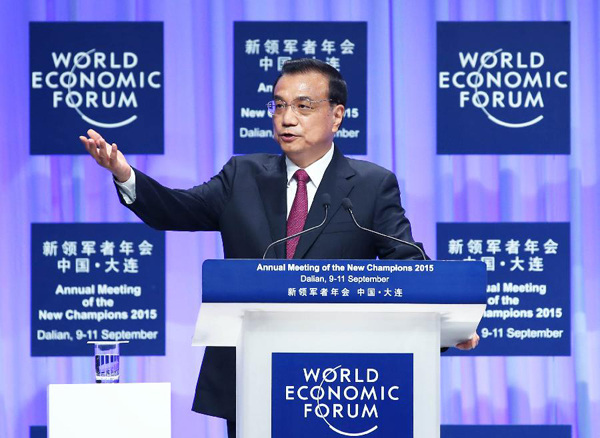
Chinese Premier Li Keqiang addresses the opening ceremony of the annual meeting of the New Champions, also known as the Summer Davos Forum, in Dalian, northeast China's Liaoning Province, Sept. 10, 2015. (Xinhua/Yao Dawei)
China is confident of a bright economic future as unremitting efforts to push structural reforms might unlock potential and unleash vitality. [Special coverage]
In his speech at the opening of the World Economic Forum's event in Dalian on Thursday, Premier Li Keqiang dispelled worries that China's economy might make a hard landing as deepened structural reforms can generate sustainable growth.
China is comprehensively deepening reform, accelerating structural reform and pursuing an innovation-driven development strategy to fully unleash the potential of economic growth, the premier said.
China has deepened market reform in finance, taxation, investment, financing and prices, adopting a host of measures to lift restrictions on market access and promote fair competition, Li said.
The authorities have been trying to encourage consumption, a difficult task given the Chinese habit of saving. However, progress has been made as consumption accounted for 60 percent of China's GDP growth in the first half of the year.
Chinese smartphone users, nearly 500 million, are using their phones to do everything from shopping to hailing taxis and ordering takeouts in a trend supported by Internet giants Alibaba, Tencent and Baidu.
"What we are watching right now is a transition of the economy to more consumption, more services and less dependency on investment," Rich Lesser, CEO of the Boston Consulting Group, said at a Summer Davos session.
China has mammoth foreign exchange reserves that stand at around 3.6 trillion U.S. dollars.
"There is plenty of water in the pool, so to speak. What is important is to get the water flowing and channel financial resources into the real economy," the premier said in his speech.
The government has introduced measures including tax reductions and streamlined government administration to spur business startups. Last week, it set up a development fund worth 60 billion yuan (9.4 billion U.S. dollars) for small and medium-sized enterprises.
Li promised to continue to ease restrictions on the access of private capital to the financial sector, and actively develop private banks, financing guarantee and financial leasing to better support the real economy.
On Monday and Tuesday, China approved eight infrastructure projects worth 147 billion yuan.
China's growth eased to 7 percent in the first half of the year, the weakest in more than two decades.
Li said that the 7-percent rise is not an easy achievement in a slowing world economy as the rate is among the highest in major economies.
"China is not a source of risks for the world economy but a real source of strength for world economic growth." Li said.


















































